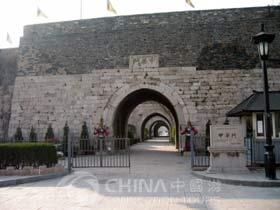 The city wall in Nanjing was first constructed in the Southern Tang Dynasty and reconstructed in the Ming Dynasty. The South Gate is the best-preserved part of Nanjing's ancient city walls. Zhonghuamen ("The Castle of China Gate") is the largest gate along the wall and is composed of three towers and four smaller gates inside one another. The gate is now separated from the rest of the wall and is located on a huge traffic island at a busy road junction. The caves built into the structure could hold 3,000 soldiers, making it the most fortified block to ward off aggressive armies. Zhonghuamen Citadel, extending 128 meters long and 118 meters wide, is the biggest of its kind in China. The outer part was made of stone bars while the inner was built with huge bricks. There are three partitioned strongholds and four gates. Each has a 500 kilometer-long vertical iron block gate and an ironclad gate. It played a very important role in the protection of the city in ancient times.
The city wall in Nanjing was first constructed in the Southern Tang Dynasty and reconstructed in the Ming Dynasty. The South Gate is the best-preserved part of Nanjing's ancient city walls. Zhonghuamen ("The Castle of China Gate") is the largest gate along the wall and is composed of three towers and four smaller gates inside one another. The gate is now separated from the rest of the wall and is located on a huge traffic island at a busy road junction. The caves built into the structure could hold 3,000 soldiers, making it the most fortified block to ward off aggressive armies. Zhonghuamen Citadel, extending 128 meters long and 118 meters wide, is the biggest of its kind in China. The outer part was made of stone bars while the inner was built with huge bricks. There are three partitioned strongholds and four gates. Each has a 500 kilometer-long vertical iron block gate and an ironclad gate. It played a very important role in the protection of the city in ancient times.
Zhonghuamen along with Hepingmen is one of the two surviving original Ming gates. It is the only one that is currently open to the public. Originally it was known as Zhubaomen, but the name was changed in the early 20th century. This gate consists of a series of courtyards linked by gates. When it was built, the gates were topped with wooden gatehouses, but these have all disappeared over the years. This part of the Nanjing wall was built atop the wall of the old Southern Tang city that existed prior to the Ming dynasty.
Zhonghuamen affords stunning views of the city and is a good place to see Nanjing's landscape.
